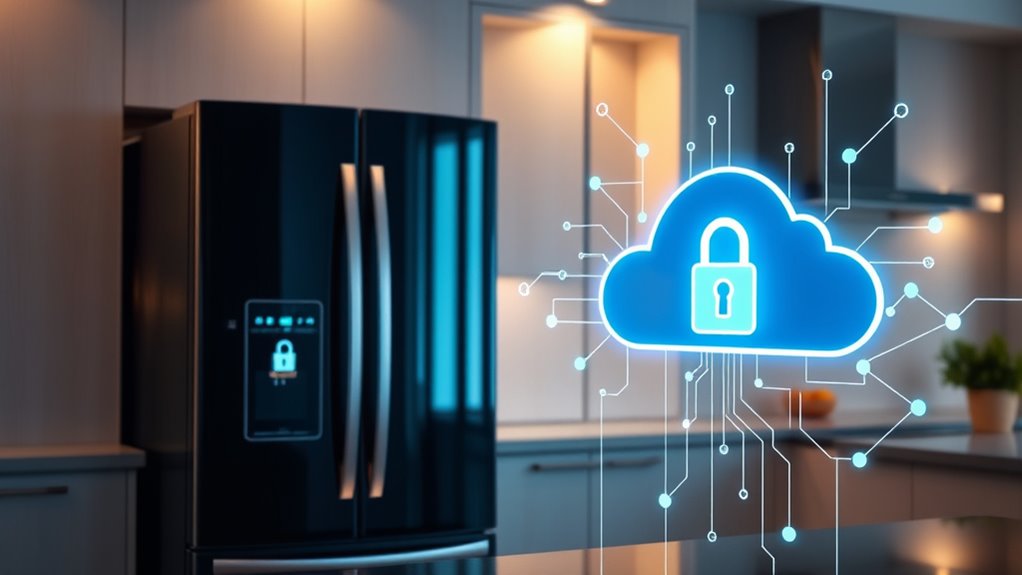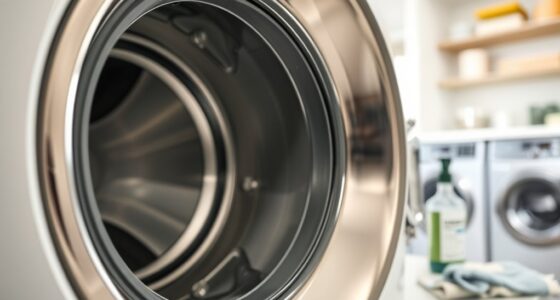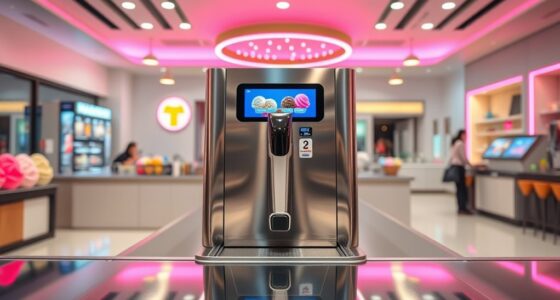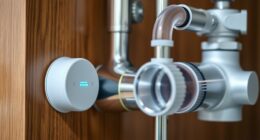Data privacy regulations like GDPR in the EU and CCPA in California impact how you collect, store, and protect data from smart appliances. These laws give you rights to user control, emphasize data minimization, and require strong security measures, such as encryption and vulnerability management. Balancing compliance with privacy standards can be challenging, but adopting best practices guarantees trust and safety. To discover more about how these regulations shape smart device data handling, keep exploring these topics.
Key Takeaways
- Regulations like GDPR and CCPA require transparent data collection practices and user consent for smart appliance data.
- Data minimization and purpose limitation principles restrict smart appliances from collecting excessive or unrelated personal information.
- Smart appliance manufacturers must implement robust security measures, including encryption and vulnerability management, to protect user data.
- Consumers have rights to access, delete, and control their data under laws such as GDPR and CCPA, affecting data handling policies.
- Continuous compliance requires monitoring evolving regulations and adopting best practices like secure authentication and regular updates.
Overview of Global Data Privacy Laws Impacting Smart Appliances

As smart appliances become more prevalent, understanding the global data privacy laws that govern them is essential. Different countries have established regulations to protect your personal data, influencing how manufacturers collect, use, and share information. For example, the European Union’s GDPR enforces strict rules, ensuring you have control over your data and requiring transparent data handling practices. In the United States, laws vary by state, with California’s CCPA giving you rights to access and delete your data. Other regions like Australia and Japan have their own privacy frameworks, aiming to safeguard your personal information. Staying informed about these laws helps you recognize your rights and encourages companies to prioritize your privacy when developing smart appliances.
Key Principles of the General Data Protection Regulation (GDPR)
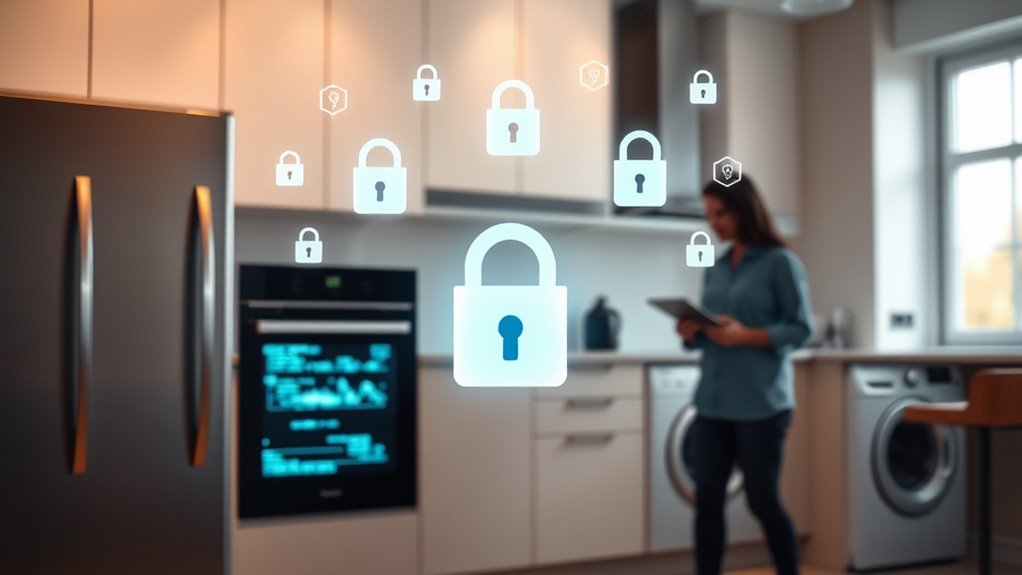
Understanding the key principles of the GDPR helps you know how to handle personal data responsibly. You must follow strict data processing requirements, ensuring transparency and security. Additionally, respecting individuals’ rights and maintaining compliance are essential to avoiding penalties and building trust.
Data Processing Requirements
Have you ever wondered what rules govern how organizations must handle your personal data? Under GDPR’s Data Processing Requirements, you’re protected by strict rules. Organizations must process your data lawfully, fairly, and transparently. They need a valid reason—like your consent or a legal obligation—to collect and use your information. You have control over what data is collected, and it must be relevant and limited to what’s necessary for the purpose. Data must be accurate and kept up-to-date. Organizations are responsible for safeguarding your data, ensuring it’s secure from unauthorized access or breaches. They can’t keep your data longer than needed. Additionally, organizations should implement appropriate security measures, such as encryption or access controls, to protect your information. For example, some organizations incorporate data minimization principles to limit the scope of data collected. Ensuring compliance with data governance standards helps organizations manage your data responsibly. Maintaining data accuracy is essential for compliance and trust. Proper data management practices are vital to uphold these standards and prevent data mishandling. Overall, GDPR emphasizes responsible data handling, giving you confidence that your personal information is managed ethically and securely.
Rights and Compliance
The GDPR’s core principles establish the rights you have over your personal data and the responsibilities organizations must follow to guarantee compliance. You have the right to access your data and know how it’s used, ensuring transparency. If you believe your data is incorrect, you can request corrections; if you want it deleted, you can exercise your right to be forgotten. Organizations must obtain your clear consent before processing sensitive information and allow you to withdraw it anytime. They are also responsible for protecting your data from breaches and reporting incidents promptly. Compliance means organizations implement measures to respect your rights, keep your data secure, and provide clear information about their data practices. Your rights are fundamental, and organizations must prioritize safeguarding your data privacy. Additionally, understanding the best practices for data management can help organizations stay compliant and protect user information effectively. Building trust through transparency is vital for fostering confidence and ensuring ongoing compliance with privacy regulations. Implementing robust security measures is equally essential to prevent unauthorized access and data leaks, thereby maintaining user trust. Incorporating privacy by design principles during product development can further enhance data protection efforts and ensure compliance from the outset. Moreover, adopting a proactive approach to monitoring data practices can help organizations quickly identify and address potential vulnerabilities before they lead to breaches.
Consumer Rights Under the California Consumer Privacy Act (CCPA)
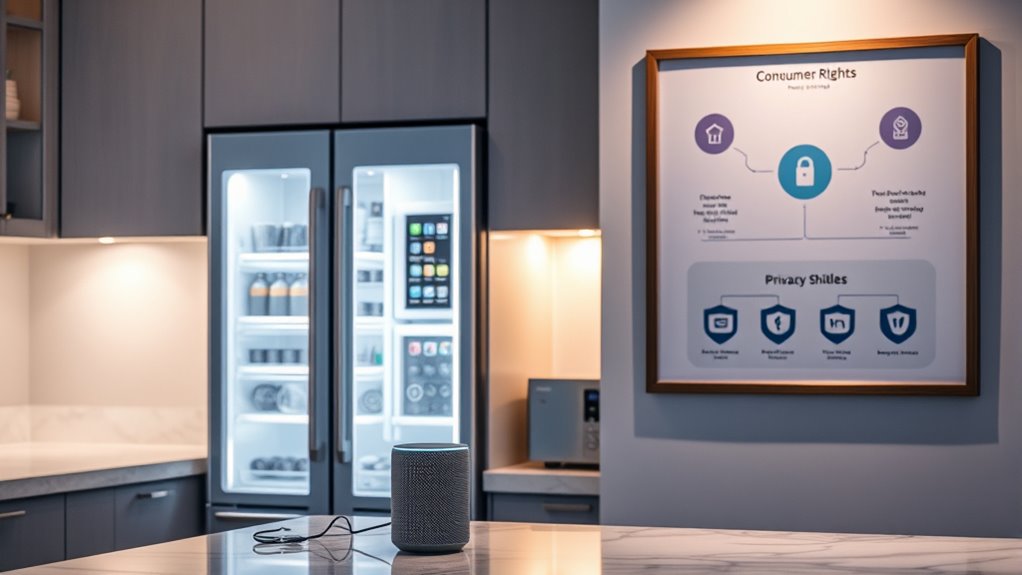
If you’re a California resident, the CCPA grants you specific rights to control your personal information. You have the right to know what data businesses collect about you, whether it’s from your smart appliances or online activity. You can request that a company delete the personal data they’ve gathered, and they must comply unless there’s a legal reason not to. You also have the right to opt out of the sale of your information, preventing your data from being shared with third parties. Additionally, companies must provide clear notices about data collection practices and respect your requests. These rights give you more control and transparency over your personal information, empowering you to make informed choices about your privacy. Implementing organizational strategies can help manage your data and protect your privacy effectively. Understanding data privacy regulations is essential to ensure your data is handled responsibly and securely. Being aware of Hamster Care Costs and other related regulations can also help you make better decisions about your data and device usage. Recognizing the importance of juice cleansing and detox concepts can guide you in making healthier lifestyle choices and understanding how your data might be used in health-related apps and services.
The Role of Data Minimization and Purpose Limitation

Data minimization and purpose limitation are fundamental principles that guide responsible data handling. You should only collect the data necessary for a specific purpose, avoiding excess or irrelevant information. When you design smart appliances, prioritize gathering just what’s needed to ensure functionality and user experience without overstepping privacy boundaries. Names inspired by famous personalities and characters can be particularly effective in establishing a friendly and engaging user interface, making the device more relatable. Purpose limitation means you must use the data solely for the reason you specified at collection, not for unrelated activities. This approach builds trust with users by respecting their privacy and reducing risks of misuse or breaches. Implementing these principles helps you comply with regulations and demonstrates your commitment to responsible data management. Additionally, aligning data practices with catering and delivery trends, such as offering health-conscious options or customizable meals, can enhance user trust and satisfaction. Understanding regulatory compliance is essential to maintain trust and avoid legal penalties. Moreover, adopting data security measures is crucial to protect sensitive information from potential threats. Ultimately, focusing on data minimization and purpose limitation protects both your consumers and your organization from legal and reputational damage.
Data Security Requirements for Smart Appliance Manufacturers
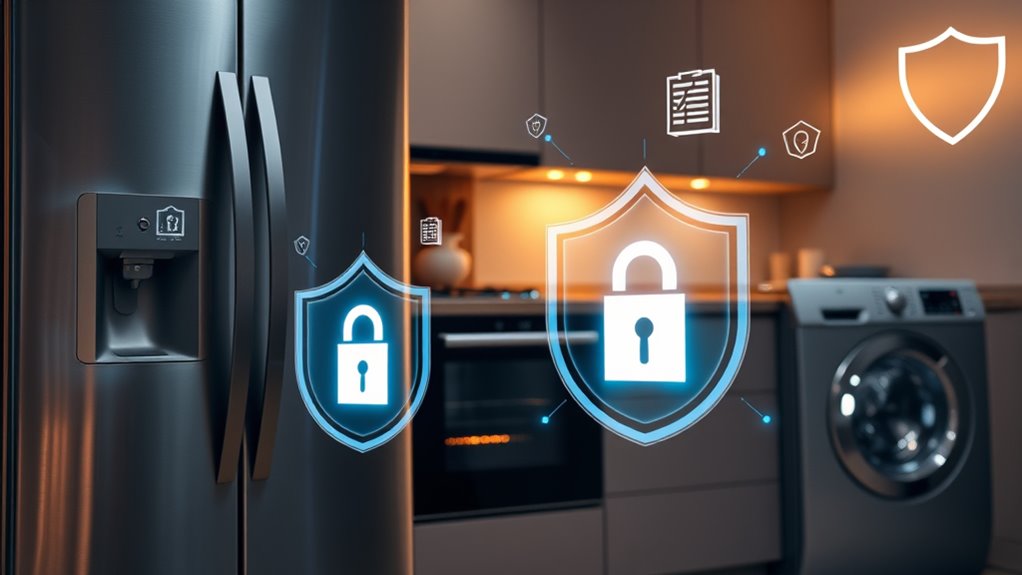
As a smart appliance manufacturer, you need to prioritize encryption standards compliance to protect user data effectively. Implementing robust vulnerability management strategies helps you identify and fix security gaps quickly. Staying proactive in these areas is essential to meet data security requirements and maintain customer trust.
Encryption Standards Compliance
Ensuring that smart appliance manufacturers comply with encryption standards is essential for safeguarding user data. Proper encryption protects sensitive information from unauthorized access and maintains user trust. You need to implement industry-approved protocols such as AES or TLS to secure data transmission and storage. Regularly updating encryption methods ensures resilience against emerging threats. Additionally, compliance often requires documentation and audits to verify encryption practices. Focus on these key areas:
- Adopting robust, industry-standard encryption protocols like AES-256 and TLS 1.3
- Ensuring encryption keys are securely generated, stored, and rotated regularly
- Maintaining thorough records of encryption procedures for compliance audits
Vulnerability Management Strategies
Implementing strong vulnerability management strategies is essential for smart appliance manufacturers aiming to protect user data and maintain trust. You need to regularly identify and assess security flaws through continuous vulnerability scanning. Prioritize patches based on risk, addressing high-severity issues promptly to minimize exposure. Maintain an up-to-date inventory of all devices, software, and hardware components to streamline vulnerability tracking. Establish clear procedures for incident response, ensuring swift action when vulnerabilities are exploited. Educate your team on security best practices and emerging threats. Use automated tools to monitor for new vulnerabilities and verify that patches are successfully applied. By proactively managing vulnerabilities, you reduce the likelihood of data breaches and demonstrate your commitment to data privacy and consumer protection.
Challenges in Achieving Compliance With Privacy Regulations
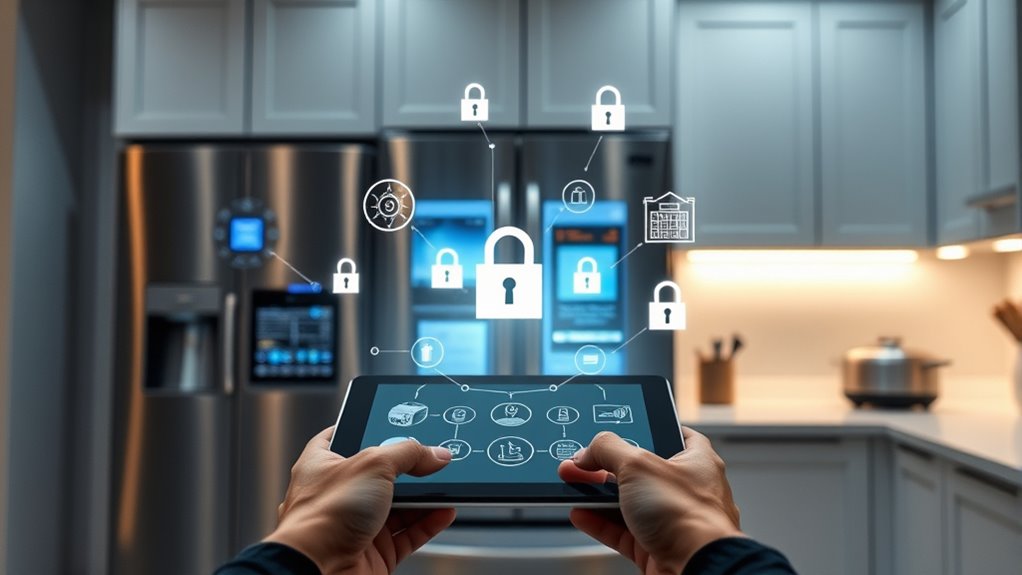
Steering the complex landscape of privacy regulations presents significant challenges for organizations, often requiring substantial resources and expertise. You must interpret diverse legal frameworks, which vary by region and evolve rapidly, making compliance a moving target. Staying updated demands ongoing training and dedicated legal support. Additionally, implementing technical measures to protect data integrity can be complex, especially with smart appliances generating vast amounts of sensitive information. You also face difficulties in:
- Ensuring data collection aligns with strict consent requirements
- Maintaining transparency while managing user expectations
- Balancing innovation with compliance costs and operational adjustments
These hurdles require a strategic approach, as failure to comply can lead to hefty fines, reputational damage, and loss of user trust. Achieving and maintaining compliance is an ongoing, resource-intensive process.
Best Practices for Protecting User Data in Smart Devices
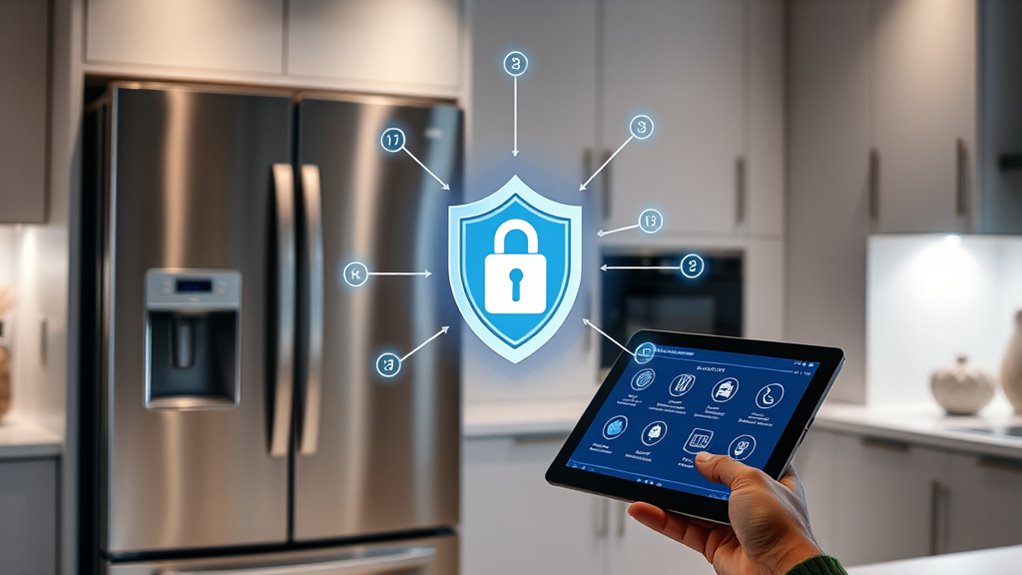
Protecting user data in smart devices requires adopting concrete strategies to address the unique risks these technologies pose. First, implement strong encryption for data at rest and in transit, ensuring unauthorized parties can’t access sensitive information. Use secure authentication methods, like multi-factor authentication, to prevent unauthorized device access. Regularly update device firmware and software to patch vulnerabilities and stay ahead of emerging threats. Limit data collection to only what’s necessary, and anonymize data when possible to reduce privacy risks. Establish clear user consent protocols and transparent privacy policies, so users understand how their data is used. Finally, monitor networks continuously for suspicious activity. These practices help safeguard user data, maintain trust, and ensure compliance with evolving privacy standards.
Future Trends and Potential Regulatory Developments
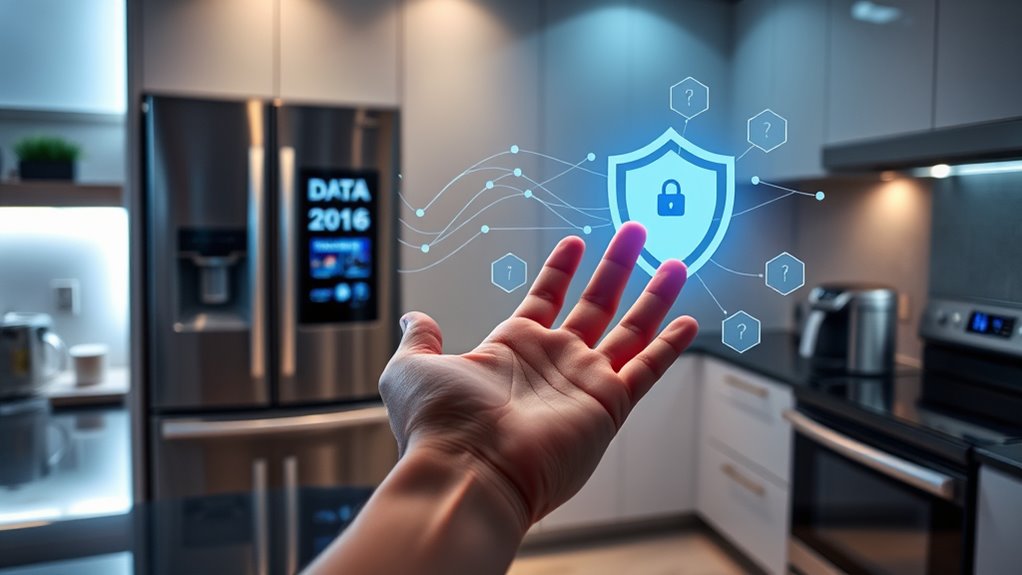
As technology advances rapidly, future trends in data privacy and security will likely focus on integrating AI-driven tools for enhanced threat detection and automated compliance. You can expect smarter systems that proactively identify vulnerabilities and adapt to emerging threats in real time. Regulatory frameworks may evolve to require transparent AI algorithms, ensuring accountability and fairness. Additionally, standards for data minimization and user consent could become stricter, emphasizing user control over personal information.
- Implementation of AI-powered monitoring for real-time data protection
- Development of standardized, transparent compliance protocols
- Increased emphasis on user-centric privacy controls and opt-in mechanisms
Frequently Asked Questions
How Do Privacy Laws Differ Across Countries for Smart Appliance Data?
You’ll find that privacy laws for smart appliance data vary worldwide. Some countries, like the EU, have strict rules requiring clear user consent and data protection measures. Others, such as the US, rely on sector-specific laws that may be less extensive. You need to stay informed about local regulations to guarantee compliance, as these laws influence how you collect, store, and share data generated by smart appliances.
What Are the Penalties for Non-Compliance With Data Privacy Regulations?
You face serious penalties if you don’t comply with data privacy regulations. These can include hefty fines, legal actions, and damage to your reputation. Authorities may also impose sanctions, restrict your business operations, or require you to change your data handling practices. To avoid these consequences, guarantee you understand and follow all applicable laws, implement strict data security measures, and maintain transparency with your users.
How Can Consumers Verify a Smart Appliance’S Data Privacy Practices?
To verify a smart appliance’s data privacy practices, you should start by reading the manufacturer’s privacy policy carefully. Check what data is collected, how it’s used, and your options for control. Look for clear contact information for privacy concerns, and search for third-party reviews or reports on the company’s privacy track record. You can also contact customer support to ask specific questions about data security and privacy measures.
Are There Specific Regulations for Data Collected by Ai-Enabled Smart Appliances?
You should know that specific regulations for data collected by AI-enabled smart appliances vary by region. In many areas, laws like the GDPR in Europe or CCPA in California set standards for data privacy, requiring transparency and user consent. These regulations aim to safeguard your personal information, but enforcement and scope differ. Stay informed about local laws and always review device privacy policies to ensure your data is handled responsibly.
How Will Emerging Technologies Influence Future Data Privacy Regulations?
You might think current privacy rules are strict, but emerging tech will revolutionize them! As AI-enabled appliances become smarter and more interconnected, regulations will need to evolve at lightning speed to keep up. You’ll see laws that fiercely protect your data, imposing huge fines on violations. This tech-driven future will make privacy a top priority, transforming how companies handle your info and ensuring you stay in control every step of the way.
Conclusion
Guiding data privacy laws is like steering a ship through changing tides—your smart appliances are the compass guiding you. By staying informed and committed to principles like data minimization and security, you anchor trust and integrity. As regulations evolve, your proactive approach becomes the lighthouse that illuminates the path forward, ensuring your users’ privacy remains protected amidst the stormy seas of digital innovation. Embrace these standards; they’re the stars guiding your journey to responsible smart device management.
